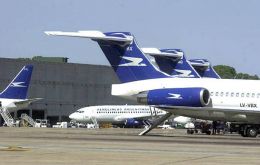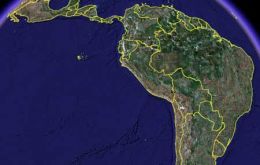MercoPress. South Atlantic News Agency
Stories for 2008
-
Monday, July 14th 2008 - 21:00 UTC
Forest fires added to UN climate change agenda

Dozens of meteorologists, fire scientists and others from 25 countries have gathered at a United Nations-backed meeting in Canada to examine how to address the intensified threat of forest fires posed by climate change.
-
Monday, July 14th 2008 - 21:00 UTC
Spanish group definitively decided to abandon Argentina

The Spanish group Marsans expects to finalize this week an agreement to sell Aerolíneas Argentinas and its subsidiary Austral to the Argentine government according to company sources in Madrid.
-
Sunday, July 13th 2008 - 21:00 UTC
Poor countries need 6 billion USD annually to pay for food
Poor countries will need some 6 billion US dollars in food aid annually, with food and energy prices expected to remain high for years to come, said Robert Zoellick, president of the World Bank.
-
Sunday, July 13th 2008 - 21:00 UTC
Aerolíneas back in the air rescued by Argentine gov.

The Argentine government could take control of Aerolíneas Argentinas and Austral to guarantee regularity of commercial flights and protect Argentine assets and 10.000 jobs, anticipated the representative of the State in Aerolíneas Argentinas Julio Alak.
-
Sunday, July 13th 2008 - 21:00 UTC
Washington promises information on IV fleet Atlantic actions
United States Assistant Secretary for Western Hemisphere Affairs Thomas Shannon said Washington will provide information to Latin American countries on the actions of the fourth fleet in Atlantic waters, to ease concerns that erupted after the United States decided to re-activate that fleet.
-
Sunday, July 13th 2008 - 21:00 UTC
US government bails out mortgage finance companies
The United States government has announced sweeping measures to shore up the nation's two largest mortgage finance companies, Freddie Mac and Fannie Mae.
-
Sunday, July 13th 2008 - 21:00 UTC
Argentina: all set for Tuesday's rallies force-demonstration
The Argentine government/farmers stand off over export taxes has scheduled a new demonstration of force next “Super” Tuesday when the presidential Kirchner couple government faithful, and farmers with city supporters, will be out on the streets of Buenos Aires in two simultaneous, but 50 blocks away separate rallies.
-
Saturday, July 12th 2008 - 21:00 UTC
US trade deficit falls in May; oil imports lowest since 2002
The United States trade deficit shrank in May even when average prices for imported oil surged during the month to a record, according to a US Department of Commerce release on Friday. The deficit narrowed to 59.8 billion US dollars from 60.5 billion in April as both exports and imports rose to record highs.
-
Saturday, July 12th 2008 - 21:00 UTC
Cubans must prepare for “realistic” brand of communism

President Raul Castro warned Cubans on Friday to prepare for a “realistic” brand of communism that is economically viable and does away with excessive state subsidies designed to promote equality on the island.
-
Saturday, July 12th 2008 - 21:00 UTC
Latam must double investment in infrastructure

In the immediate future, Latinamerica must invest between 150 and 200 billion US dollars a year in infrastructure in order to boost economic growth and reduce poverty, World Bank Vice President, Pamela Cox said in Lima, Peru.
